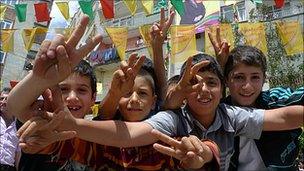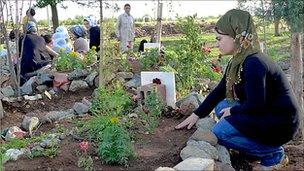Turkey election: Kurdish anger looms over vote
- Published
WATCH: The BBC's Jonathan Head describes the scenes of protest in Diyarbakir
Attempts to solve Turkey's Kurdish question have stalled, and growing anger among Kurds raises fears of renewed violence after this weekend's general election.
Prime Minister Recep Tayyip Erdogan's "Kurdish Initiative" launched two years ago, has now been sidelined.
As a result, support for his AK Party among Kurds - who are reckoned to make up between 10% and 20% of the population - is dwindling.
The day he chose to visit Diyarbakir, in the Kurdish south-east, the boys of Baglar district arranged a welcome for him.
Not that Mr Erdogan was likely to go to a neighbourhood notorious for its militant support for the armed insurgents of the PKK, or Kurdish Workers Party. He was a kilometre away, speaking to a crowd of loyalists, carefully guarded by snipers on the roofs of nearby buildings.
Still, the boys came out for what has become a familiar routine in Kurdish towns and cities. Police armoured vehicles drove down the street, hurling abuse at the boys from their speaker systems.
The kids pelted the trucks with stones; the police responded with water cannon and volleys of tear-gas grenades. We watched them do this four times in one hour.
It might have been a game but anyone over the age of 12 caught at a pro-PKK protest can be prosecuted as a terrorist. The prisons of the south-east are filled with boys and girls serving long sentences. Few of the boys we spoke to attended school.
'Could join tomorrow'
Rohat, 18, is obviously bright, and ambitious to do well. But he has just been released from a 14-month stint in jail, without being convicted, on suspicion of being a PKK supporter. It has badly disrupted his education plans, although he still hopes to finish high school and study psychology at university.

Kurdish children seem to have no fear of the Turkish authorities
I asked if he ever considered joining the PKK fighters in the mountains. Yes, he said. How easy is it? He laughed. "We all know who to contact. We could go tomorrow."
The PKK is a banned organisation in Turkey, and is regarded as a terrorist group by the US and the EU.
Since the rebels took up arms in 1984 more than 40,000 people have been killed - most of them civilians, but many young Turkish soldiers too. The deaths continue, with the PKK bombing military and civilian targets, and the army hitting PKK hideouts in the mountains.
Any show of support for the group - even using the respectful honorific "sayin" ("mister") when referring to its jailed leader Abdullah Ocalan - can land someone in jail for many years.
Jailed leader feted
Yet Kurds are defying these draconian laws. I saw little girls shouting their support for the PKK, although they can hardly have any idea about the organisation's bloody history.
BDP rally ahead of the Turkish general election
And the Kurdish party, the BDP, is using this election campaign to throw down the biggest challenge yet to the state's demonisation of the PKK.
At its main rally in Diyarbakir, old women belted out songs praising Ocalan and his movement, and young men unfurled banners carrying his face - their own carefully hooded to conceal them from the ever-present police photographers.
The BDP makes no secret of its links to the PKK. Ocalan is assumed to have had the final say, from his prison cell, over its parliamentary candidates. The party is expected to do well in Diyarbakir - at the expense of Mr Erdogan's AKP.
The prime minister drew a decent-sized crowd for his rally. His record of economic success and Islamic piety strikes a chord, even in this, the most militant Kurdish city. But that crowd was noticeably smaller and less lively than the one for the BDP.
Scorched-earth campaign
Mr Erdogan has little to show for his "Kurdish opening", which promised a new approach to the Kurds, based not on military force, but on tolerance and greater autonomy. They do enjoy improved cultural freedom, though anger over the continued political prosecutions has drowned out any gratitude.
But Mehdi Eker, the AKP's minister for agriculture, and a Kurd from the city, insisted the reforms made by his government were significant.
"You can't say these are just small steps. The freedom to use Kurdish language, the recognition of the Kurdish problem by the prime minister, and of the Kurdish identity. Most Kurdish people are satisfied with this," he said.
Many of Diyarbakir's inhabitants came from the thousands of villages destroyed by the army during its scorched-earth campaign against the PKK in the 1990s. The trauma of that campaign is still seared into the memories of those who lived through it.
One of them, Adnan, took me back to his village, high in the hills north-east of Diyarbakir. His family was driven out, along with their neighbours, in May 1993, and the village destroyed. At the age of 12 he watched his father, uncle and cousin being marched away by the army. Their bodies were later found in a mass grave nearby. After eight years his mother was allowed to return and rebuild their house.
Adnan, who is now 30, has stayed in Diyarbakir to try to complete his education, which was disrupted for years when he had to work in the cotton fields to help support his family.

The graves of PKK fighters are tended by relatives in Diyarbakir
"Turkey has lost the younger generation of Kurds," says renowned journalist Cengiz Candar. He blames the army, but says even the AKP, for all its attempts to rein in military excesses, still sees the Kurdish problem through the same nationalist prism as the soldiers.
"Ours is the last generation of Kurdish politicians that can shake hands and negotiate with the state," warns Osman Baydemir, the Kurdish mayor of Diyarbakir.
Younger Kurds, angry and rootless in the cities, are becoming more radical, he says.
Eighteen-year-old Rohat agrees. Younger Kurds, he says, are not afraid of the security forces, like their parents. They did not experience the war of the 1990s. But they have inherited the deeply-ingrained sense of injustice from that time.
- Published4 June 2011
- Published4 November 2010
- Published18 October 2010